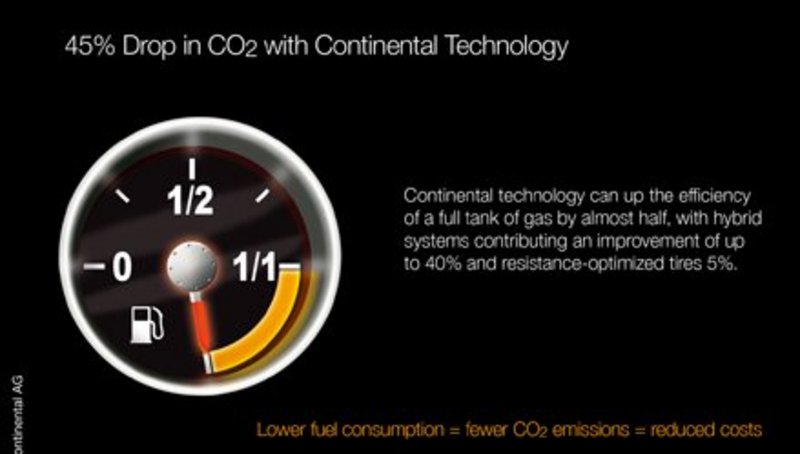Continental Hard at Work on CO2 Reduction
- Hybrid systems cut CO2 emissions by up to 40 percent
- Further drop in tire rolling resistance targeted
- Tire pressure monitoring systems make for optimum performance
- Commercial vehicle control units meet impending stringent exhaust limits
Hanover, February 13, 2007. With the automotive industry and ultimate consumers in mind, Continental AG is hard at work developing products that will be able to make a real difference in reducing traffic-related CO2emissions. The most significant examples here are hybrid systems, engine control units, car and commercial vehicle tires with optimized rolling resistance and tire pressure monitoring systems.
In the last five years the international automotive supplier has, moreover, reduced CO2 emissions by more than 30 percent per product tonne. "The current discussion in the European Union surrounding climate protection and the latest CO2 target values for the automotive industry underscore the fact that especially with our hybrid systems, we are offering forward-looking technology," stresses Manfred Wennemer, chairman of the Continental Executive Board.
"A so-called mild hybrid itself accounts for considerable fuel savings at a relatively low additional cost. In doing so, it also reduces CO2 emissions, without, for all that, forcing compromises in terms of performance and driving pleasure," elaborates Dr. Karl Thomas Neumann, Continental Executive Board member for the Automotive Systems division. "A full hybrid can achieve fuel economies of up to 40 percent and correspondingly lower emissions. We are in close collaboration with German automakers to develop products like this. These are, in fact, very close to production readiness. Insofar it is quite unwarranted to charge that the German automotive industry is sitting on its hands here."
Dr. Neumann also drew attention to the CO2 optimization achieved with the new generation of Continental commercial vehicle engine control units. The units that entered into production at the end of 2006 are designed to ensure compliance with impending lower emission limits, including EPA (U.S. Environmental Protection Agency) 2007, Japan 09, and Euro 6. They can also up the fuel efficiency of commercial vehicles.
Wennemer pointed out that in working to lower the rolling resistance of its tires, Continental has – for years now – concentrated on reducing CO2 emissions. Today it has an edge on the competition in this regard. "We expect this matter to become ever more important in the automotive industry and with ultimate consumers in the next few years – and thus become a more significant factor in tire development as well," he said. A case in point is a ultra low-resistant tire. It can up a car's fuel efficiency by around 5%. This translates into fuel savings of roughly 56 liters for an average car's annual mileage and thus savings of around EUR67 at the pump and a 135-kg reduction in CO2 emissions. In developing new tires, Continental will continue to rigorously pursue the goal of higher fuel efficiency.
The development has been much the same for commercial vehicle tires. With its latest tire generation, Continental has been able to reduce the rolling resistance coefficient a further 8%. "The resulting marked improvement in fuel efficiency not only cuts costs for haulers. It also makes a valuable contribution to protecting the environment. For a typical semitrailer truck on Europe's roads the reduction in fuel consumption translates into cost savings of over €1,400 a year. At the same time, CO2 emissions are cut by up to 3 tonnes," says Dr. Hans-Joachim Nikolin, Continental Executive Board member for commercial vehicles. He also stressed how much optimum inflation pressure impacts on rolling resistance. "Our calculations show, for example, that in the US alone, the fact that commercial vehicle tires are underinflated by an average 12% increases annual diesel fuel consumption by around 4 billion liters and generates more than 9 million tonnes of easily avoidable CO2 emissions.“
Wennemer pointed to the fact that tire pressure monitoring systems can already help to slash CO2 emissions in cars and commercial vehicles. "Combined with telematic systems, smart tires will be able to do even more in the future. And Continental is excellently positioned in this regard," says Wennemer.
